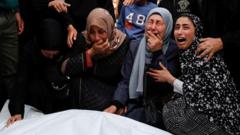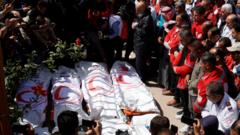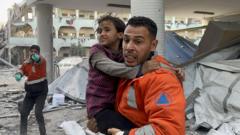New revelations underscore the complexities of conflict as international scrutiny intensifies.
# Israeli Military Acknowledges Mistake in Gaza Aid Worker Killings

# Israeli Military Acknowledges Mistake in Gaza Aid Worker Killings
The military's admission follows video evidence contradicting initial claims about the strike.
In a significant turn of events, the Israeli military has publicly acknowledged errors in its initial reporting regarding the deaths of 15 aid workers in Gaza last month. This admission surfaced after video evidence, obtained by The New York Times, contradicts the military's claim that its troops fired on vehicles deemed to be advancing suspiciously. The footage, revealed to feature emergency lights on ambulances and a fire truck, has drawn widespread media attention and condemnation.
Initially, the Israeli military insisted that its actions were justified due to the convoy allegedly moving towards them without headlights or emergency signals. However, the newfound video evidence paints a starkly different picture, prompting the military to retract its original statements – now labeling them as “mistaken.” This quick response is notable, as internal investigations into dubious military actions typically require extensive time, often delaying public accountability.
The tragic incident has highlighted ongoing tensions in the region and increased calls for more stringent oversight regarding military actions impacting humanitarian operations. As international bodies scrutinize the army's conduct, the ramifications of this episode resonate throughout multiple dimensions of ongoing conflict—questioning narratives, concluding truths, and the realities faced by those on the ground.
Initially, the Israeli military insisted that its actions were justified due to the convoy allegedly moving towards them without headlights or emergency signals. However, the newfound video evidence paints a starkly different picture, prompting the military to retract its original statements – now labeling them as “mistaken.” This quick response is notable, as internal investigations into dubious military actions typically require extensive time, often delaying public accountability.
The tragic incident has highlighted ongoing tensions in the region and increased calls for more stringent oversight regarding military actions impacting humanitarian operations. As international bodies scrutinize the army's conduct, the ramifications of this episode resonate throughout multiple dimensions of ongoing conflict—questioning narratives, concluding truths, and the realities faced by those on the ground.





















